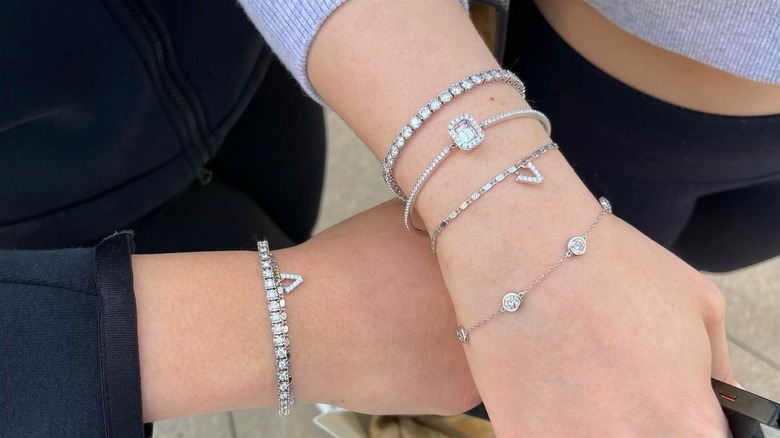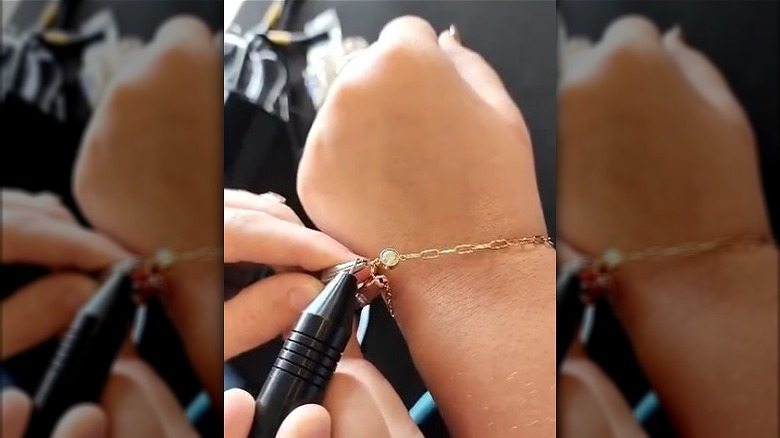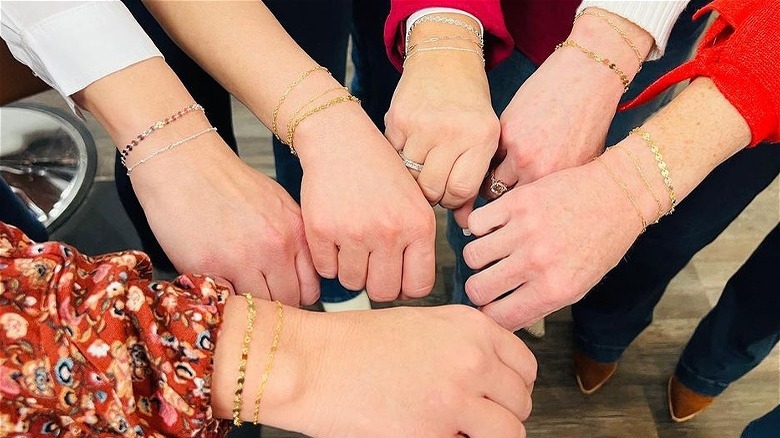Permanent Jewelry Is All The Rage But It Comes With More Than A Few Risks
Are you thinking about getting permanent jewelry? We totally get why. The trend is all over the place right now and is a great way to show off your love for someone. "Jewelry has served as a physical manifestation of emotions since the beginning of time, and I love thinking about how modern interpretations link back to previous eras," Founder and CEO of Stone and Strand Nadine Kahane explained to TZR. Many people chose to get permanent jewelry with someone else, kind of like a friendship bracelet. Having something you can't easily take off on your body that links you to someone else can be super meaningful.
Permanent jewelry is exactly what its name implies. You can't simply take it off. The process involves having your selected piece professionally fused onto you. That may sound scary, but it's totally painless as the welding never touches your skin. This gives you the ability to make sure it fits properly and eliminates the worry of it dropping off. It's welded together so you can only remove it by literally cutting it off. It's not like your regular bracelet, necklace, or anklet because you can't swap it out or take it off at the end of the day. But, while there are plenty of plusses to getting permanent jewelry, also known as getting zapped, it's not all positive. Here's what you need to consider before heading for the weld.
Permanent jewelry could put your health at risk
The first thing you'll need to be mindful of before getting zapped is if you have any allergies to any metals. Most permanent jewelry is made from gold, which can sometimes contain a little nickel — something many people have an allergy to. Let's be honest, redness and swelling are certainly not what you want to experience right after having something welded to your body. Because of that, The Skimm recommends getting a patch test before you get anything too long-lasting.
Not only that but visiting places like water parks where it's recommended you remove anything that could get caught on water slides could be a no-no. If you can't take off your bracelet, for example, you may have to say bye-bye to your favorite water attractions or risk an injury. It's also not ideal for people who play sports, as things like necklaces can quickly become choking hazards or often aren't allowed during games.
Equally, your permanent jewelry may not be the most comfortable thing in the world forever. Not only could it get in the way while you're trying to sleep, but you may also find that things like bracelets get less comfortable as your weight naturally fluctuates. That means it's not usually recommended for anyone with a medical condition that can cause weight gain or pregnant women.
Permanent jewelry poses more than just health risks
It's not just your health you should consider when it comes to deciding if permanent jewelry is for you. You may also find yourself limited in your day-to-day life. Hopefully you won't have to have them, but there are some medical tests where anything metal has to be removed. For example, if you have to undergo an MRI scan, that would mean cutting off anything permanent and metal like necklaces or bracelets so it doesn't skew your results.
It could also make things like going on vacation or entering a secure building more difficult. Depending on the type of metal and the number of pieces you have, you could set off metal detectors. If you're determined to keep your metal accessories on, this may mean some severe disruption to your routine — potentially on a daily basis.
It's also worth noting that accessories designed to be worn permanently can be made from quite delicate chains, which can make them susceptible to getting caught on your clothing or even snapping. The delicateness of the chain can also push the price up compared to some regular jewelry, while there are also more superficial risks. With removable accessories, you can easily match them to your outfits, but with permanent ones, you're running the risk of it flat-out clashing with what you're wearing.


